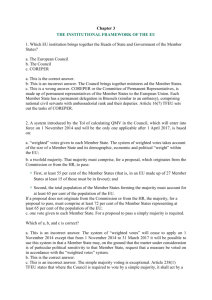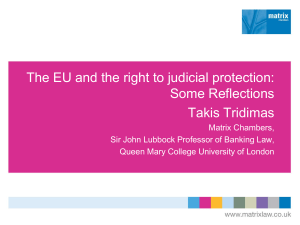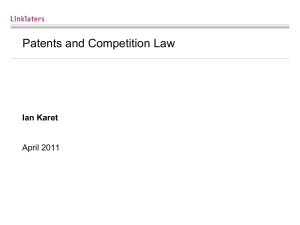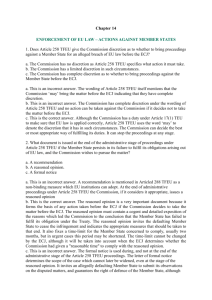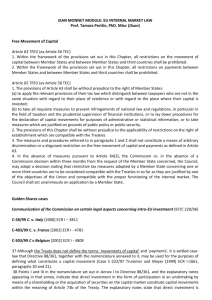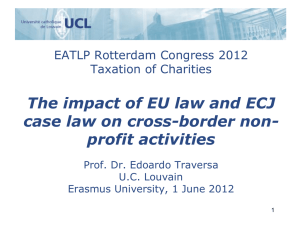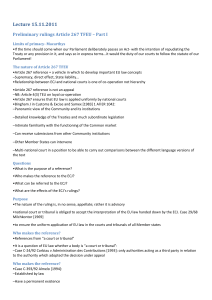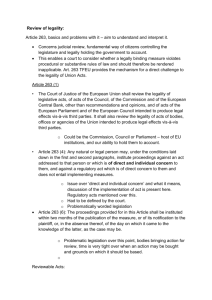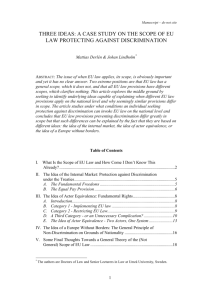Judicial review
advertisement
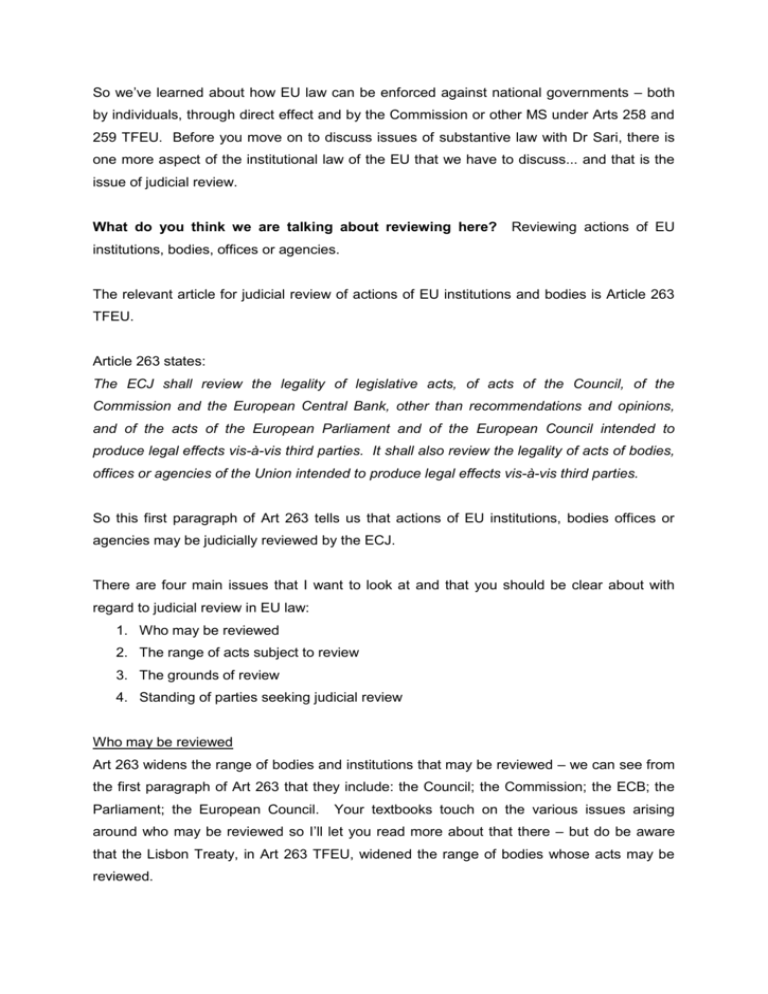
So we’ve learned about how EU law can be enforced against national governments – both by individuals, through direct effect and by the Commission or other MS under Arts 258 and 259 TFEU. Before you move on to discuss issues of substantive law with Dr Sari, there is one more aspect of the institutional law of the EU that we have to discuss... and that is the issue of judicial review. What do you think we are talking about reviewing here? Reviewing actions of EU institutions, bodies, offices or agencies. The relevant article for judicial review of actions of EU institutions and bodies is Article 263 TFEU. Article 263 states: The ECJ shall review the legality of legislative acts, of acts of the Council, of the Commission and the European Central Bank, other than recommendations and opinions, and of the acts of the European Parliament and of the European Council intended to produce legal effects vis-à-vis third parties. It shall also review the legality of acts of bodies, offices or agencies of the Union intended to produce legal effects vis-à-vis third parties. So this first paragraph of Art 263 tells us that actions of EU institutions, bodies offices or agencies may be judicially reviewed by the ECJ. There are four main issues that I want to look at and that you should be clear about with regard to judicial review in EU law: 1. Who may be reviewed 2. The range of acts subject to review 3. The grounds of review 4. Standing of parties seeking judicial review Who may be reviewed Art 263 widens the range of bodies and institutions that may be reviewed – we can see from the first paragraph of Art 263 that they include: the Council; the Commission; the ECB; the Parliament; the European Council. Your textbooks touch on the various issues arising around who may be reviewed so I’ll let you read more about that there – but do be aware that the Lisbon Treaty, in Art 263 TFEU, widened the range of bodies whose acts may be reviewed. Range of acts subject to review Also notable is that this new Article 263 as introduced by the Lisbon Treaty – introduces something that was previously introduced and implement only through case law and in particular the ERTA case (Case 22/70 Commission v Council) – and that is the principle that it doesn’t matter what the act is called so much as what it does – i.e. a measure will be reviewable not merely when it is a formal legal act but, notwithstanding its form, when it is intended to produce legal effects. In the ERTA case the ECJ held that a particular Council resolution was a legal act and consequently, the Commission could challenge it (under what was then Art 230 EC) Another case to look at in this regard is Case 60/81 IBM v Commission [1981] ECR 2639 – detailed in textbooks. So what the act is called is immaterial – the key question is whether it produces legal effects. In terms of how the ECJ decides if something has legal effects: If the institution in question does not have the competence to adopt the act then it cannot be considered to produce legal effects and so the act won’t be reviewable. See Case C-50/90 Sunzest v Commission [1991] ECR I-2917 (citrus fruit from Cyprus) – the difficulty with this of course s that it is often hard to know if the institution in question has some competence or not, and everything therefore hangs on fine-grained interpretations of whether it has the power to do something or not. The language in the act in question should be ‘reasonably imperative’ and alter the institutions position then for it to be reviewable. In other words, simply restating an existing position is not a reviewable act – Case T-351/02 Deutsche Bahn v Commission [206] ECR II-1047 If the act in question brings to an end or suspends some decision-making procedure then it is likely to be reviewable Case T-3/93 Air France v Commission[1994] ECR II121 Grounds of review Article 263 TFEU (paragraph 2) [The ECJ] shall... have jurisdiction in actions brought by a MS, the European Parliament, the Council or the Commission on grounds of lack of competence, infringement of an essential procedural requirement, infringement of the Treaties or of any rule of law relating to their application, or misuse of powers. So there are four grounds for bringing an action under Art 263. 1. Lack of competence – this means that the bodies that adopted the act did not have the power to do so. For example, in Case C-327/91 France v European Commission [1994] ECR I 2533, France successfully argued before the ECJ that the European Commission had not had the competence to conclude an agreement on policy with America. The Commission was merely authorised to negotiate the agreement and it was the role of the Council of the EU to actually conclude the agreement. Similarly, an assertion that the institution in question used the wrong treaty base for legislation is another way of saying that the institution did not have competence to base that legislation on the particular treaty article that they have purported to do so. 2. Infringement of an essential procedural requirement – for example Article 256 TFEU provides that EU legislation must state the reasons behind the adoption of that legislation. That is an essential procedural requirement. So a failure to do that would amount to an infringement of an essential procedural requirement. This was the case in Case 24/62 Germany v Commission [1963] ECR 63 where Germany successfully challenged a Commission decision relating to the import of wine into Germany. Another example of an infringement of an essential procedural requirement arose in Case 138/79 Roquette Freres v Council (what happened in that case?) – in which the ECJ annulled Community legislation adopted under the consultation procedure because the Council had failed to wait for the European Parliament’s opinion before adopting that legislation. 3. Infringement of the Treaties or any rule relating to their application – for example we know that Art 5 TEU provides what? – proportionality – EU legislation should not go beyond what is necessary to achieve the objectives of the Treaty. In Case 114/76 Bela-Mühle v Grows-Farm [1977] ECR 1211, the ECJ was prepared to annul EU legislation that breached the principle of proportionality 4. Misuse of power – here, whilst it is acknowledged that EU institutions and bodies do possess the power to act, it is alleged that they have used that power for improper purposes. For example, in Case 105/75 Giuffrida v Council [1976] ECR 1395 an unsuccessful applicant for a job at the European Commission successfully challenged the Commission’s job competition on the grounds that the Commission had held the job competition solely for the purpose of promoting an existing Commission employee to a higher grade. This was found to be a misuse of the Commission’s power to hold a recruitment exercise. Standing of parties wishing to bring a case Article 263 TFEU [The ECJ] shall... have jurisdiction in actions brought by a MS, the EP, the Council orthe Commission.... The Court shall have jurisdiction under the same conditions in actions brought by the Court of Auditors, the ECB and the Committee of the Regions for the purpose of protecting their prerogatives. Any natural or legal person may, under the conditions referred to in the first and second subparagraphs, institute proceedings against an act addressed to that person or which is of direct and individual concern to them, and against a regulatory act which is of direct concern to them and does not entail implementing measures There are, therefore, three categories of applicants under Article 263 TFEU: 1. Privileged applicants: the Council, the EP, the Commission and the MS. They can bring an action for annulment against all reviewable acts and are not required to justify their interest to act. The only condition that they have to satisfy is to bring proceedings within the time limit set out in Article 263(5) TFEU. 2. Semi-privileged applicants such as the CoA, ECB and CoR, can only challenge acts which encroach on their prerogatives. They must respect the deadline set out in Artice 263(5) TFEU. 3. Non-privileged applicants: natural and legal persons are non-privileged applicants. First of all to start an action under Art 263 a natural or legal persons must show that they have an interest in seeking the annulment of the act in question. – in almost every action this ‘legal interest’ will be obvious because the act in question will have brought about a detrimental change n the applicant’s legal position. Prior to the entry into force of the ToL, non-privileged applicants were rarely successful unless they were the direct addressees of a decision (i.e. a classic judicial review situation). If they weren’t the direct addressees of a decision they had to satisfy admissibility thresholds by establishing that they were directly and individually concerned by a decision addressed to ‘another person’ or that an act in the form of a regulation or a directive was in fact a decision addressed to them. To establish such an individual concern was extremely difficult because a non-privileged applicant had to show that the effect of such an act was so peculiar to him, and to him alone, that he was individually distinguished by the measure from everybody else. The Lisbon Treaty however has facilitated access to the ECJ for non-privileged applicants in that it makes a distinction between challenges concerning regulatory acts and non-regulatory acts. One problem that we do have with Art 263 TFEU is that there is no definition, either in this particular article or in the Treaties in general, of what a ‘regulatory act’ is. There are two plausible interpretations of the concept of regulatory act: 1. A regulatory act is an act of general application which produces legal effects, regardless of its legislative nature. If we take this interpretation – all regulations would be regulatory acts. 2. Only non-legislative acts (i.e. acts other than those adopted in accordance with either the ordinary legislative procedure or special legislative procedures) should be regarded as regulatory acts. Probably, the most plausible interpretation of the concept of ‘a regulatory act’ is that only non-legislative acts should be regarded as regulatory acts (i.e. acts other than those adopted in accordance with the ordinary legislative procedure and special legislative procedures should be regarded as regulatory acts). Read textbook to find out more So we can take regulatory acts as acts which do not entail any implementing measures. In terms of regulatory acts, non privileged applicants have only got to prove that they are directly concerned by the act. And this is fairly easy to establish. To establish that they are directly concerned, applicants must show that the contested measure affects their legal position and that the measure leaves no discretion to its addressee as to its implementation. Therefore, it is the action or inaction of the addressee that is of direct concern to applicants, not the decision itself. With regard to non-regulatory acts – in order to have such acts reviewed by the ECJ, individuals must still establish that the act is of individual concern to them. And the test to show individual concern is still the same as it was before the Lisbon Treaty came into effect. The case that we need to look at to establish individual concern is the Plaumann case – Case 26/62 Plaumann v European Commission[1963] ECR 95. In that case the Court held: Persons other than those to whom a decision is addressed may only claim to be individually concerned if that decision affects them by reason of certain attributes which are peculiar to them or by reason of circumstances in which they are differentiated from all other persons and by virtue of those factors distinguishes them individually just as in the case of the person addressed So under the PLaumann test the applicant must show that he is affected by the contested measure by reason of certain attributes which are peculiar to him or by reason of circumstances which differentiate him from all other persons. This ‘test’ fir individual concern has not been applied in many cases and there are perhaps 2 main situations which can be identified in which an individual or a company will be able to show that a decision addressed to someone else is of individual concern to them: 1. Where the decision affects the applicant equally as much as it affects the person to whom it wasw actually addressed and the applicant is either the only other person affected by this decision or is one of a small number of people in a closed class (i.e. there cannot be future additions to the list of affected people). For example in Cases 106 and 107/63 Alfred Toepfer v European Commission [1965] ECR 405, Toepfer was held to be individually concerned by a decision Commimssion addressed to Germany. issued by the European The decision approved of a measure adopted by the German government to refuse to grant an import licence for cereals. Only Toepfer and others like him who had actually applied for this licence were affected. Therefore, he was found to be individually concerned by the decision. 2. Where the decision was issued by the EU as a direct result of legal proceedings brought by the apolicant or in which the applicant had played an important role. For example, in Case 264/82 Timex Corporation v Council[1985] ECR 849, Timex were able to challenge a decision that was in the form of a regulation. The regulation had been adopted by the European Commission as a direct result of legal proceedings instituted Tmex. The ECJ found that, as a result of this fact, Timex was individually concerned by the EU legislation in question. Originally, the Plaumann text was quite difficult – the interpretation of ‘individual concern’ was very strict and this was widely criticised. As a result the ECJ has, over time, relaxed this strict interpretation – I’ll let you read more about this in your text books. HOWEVER the relaxation of excessive rigidity in the interpretation of the concept of individual concern has not really been enough. In many cases applicants have alleged that they have been denied justice because they have no effective judicial protection under their national laws of the rights deriving from the EU legal order. The ECJ has not been sympathetic to them and has basically nipped in the bud any attempt by the General Court to change the strict approact to the interpretation of Art 263 – see Case C-50/00P Union de Pequenos Agricultores – the Court has consistently held that applicants are sufficiently protected as long as they have access to a court – whether that is a national court or the ECJ So we’ve looked at what acts can be reviewed, the grounds for review and locus standi. So what if all of that is ok and an action is successful before the ECJ? Well in that case the ECJ, by virtue of Article 264 TFEU will declare the contested act void. The institution which adopted the act is (under Art 266 TFEU) required to then take all necessary measures to comply with the judgment. In exceptional circumstances the ECJ may declare all or some provisions of the annulled act to be operative until a competent institution adopts an act which will replace the one struck down by the Court.
